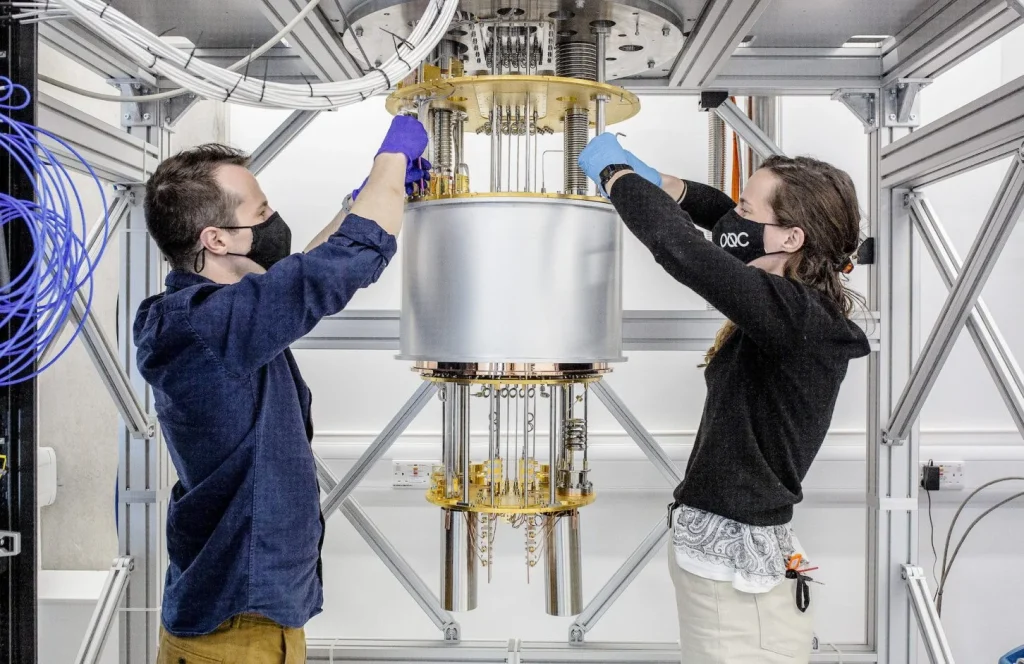Oxford Quantum Circuits (OQC) has developed a breakthrough in quantum error detection using its proprietary dual-rail Dimon qubit technology. The new approach enables reproducible, error-suppressed qubits, significantly reducing the hardware needed for fault-tolerant quantum computing. This advancement paves the way for scalable, affordable quantum systems, bringing practical commercial applications closer to reality across finance, security, and data-driven industries.

Oxford Quantum Circuits (OQC), a leader in quantum computing technologies, has announced a significant advancement in quantum hardware design that could accelerate the arrival of commercially viable quantum computers.
The company’s latest research, published on arXiv, introduces a novel approach to error detection at the physical qubit level, which has long been a bottleneck for scalable quantum computing.
Reducing hardware overhead in quantum error correction
One of the major challenges facing quantum computing today is the inherent instability and error-prone nature of qubits, the fundamental units of quantum information. While current quantum systems have demonstrated capabilities beyond classical machines for certain tasks, widespread commercial application has been constrained by the high error rates of individual qubits.
Traditionally, to counter these errors, researchers have relied on quantum error correction schemes that require a large number of physical qubits to encode a single logical, error-corrected qubit. This has led to the assumption that useful quantum computers would need thousands or even millions of physical qubits, substantially increasing system size, cost, and complexity.
OQC’s new research introduces a more efficient path forward. At the core of the company’s approach is its patented dual-rail dimon qubit technology, known as the Dimon approach, which enables error suppression and detection at the level of individual physical qubits. This breakthrough significantly lowers the number of qubits required for logical error correction, opening the door to more compact and cost-effective quantum systems.
The Dimon approach and its technical implications
The Dimon architecture employs a “dual-rail” design that not only enhances error-detection capabilities but does so with minimal increases in physical size and complexity. The company’s experiments have demonstrated reproducible, error-suppressed qubits, a critical requirement for real-world quantum computing. With this, OQC presents a credible path towards fault-tolerant quantum computing using far fewer physical qubits than previously assumed.
This approach also offers an architectural advantage: it maintains qubit quality and stability while scaling. By significantly lowering the overhead associated with quantum error correction, OQC’s methodology improves the hardware efficiency of quantum processors, allowing for faster realisation of high-performance quantum systems.
Enabling commercial applications across sectors
OQC believes this development could mirror the evolution of classical computing in the 20th century, where technological advances made computing accessible beyond elite laboratories and enabled mass-market commercialisation. With its hardware-efficient strategy, OQC aims to build scalable quantum infrastructure capable of handling millions of operations by 2028.
This would have direct implications for sectors requiring complex computational tasks, such as fraud detection, financial modelling, and data classification. By reducing both the cost and scale of quantum hardware, the technology could make quantum computing accessible to a broader range of commercial and strategic users.
Strategic vision and industry integration
OQC is actively working to integrate its quantum systems into commercial data centres, having already positioned itself as Europe’s first Quantum-Compute-as-a-Service provider. The company’s roadmap aims to deliver enterprise-grade quantum systems optimised for real-world applications in finance, defence, and national security.
This research underpins the company’s broader mission to create a sustainable and practical quantum ecosystem, supporting sovereign digital infrastructure and solving high-impact problems that are currently beyond the reach of classical computation.
About Oxford Quantum Circuits (OQC)
Oxford Quantum Circuits is at the forefront of quantum computing development, focusing on building scalable, application-ready quantum systems. Spun out from Oxford University, OQC provides quantum solutions tailored for strategic advantage in industries such as finance, security, and defence. Through its data centre integrations and Quantum-Compute-as-a-Service platform, the company is delivering quantum capability directly to commercial users.

Himani Verma is a seasoned content writer and SEO expert, with experience in digital media. She has held various senior writing positions at enterprises like CloudTDMS (Synthetic Data Factory), Barrownz Group, and ATZA. Himani has also been Editorial Writer at Hindustan Time, a leading Indian English language news platform. She excels in content creation, proofreading, and editing, ensuring that every piece is polished and impactful. Her expertise in crafting SEO-friendly content for multiple verticals of businesses, including technology, healthcare, finance, sports, innovation, and more.










